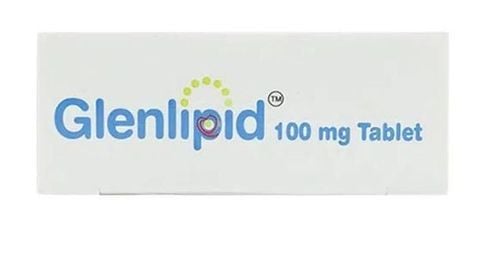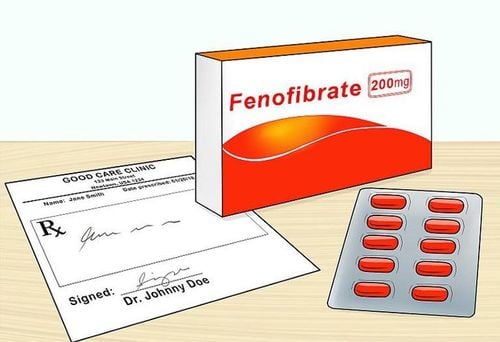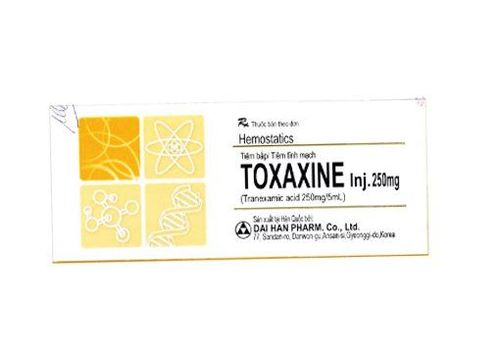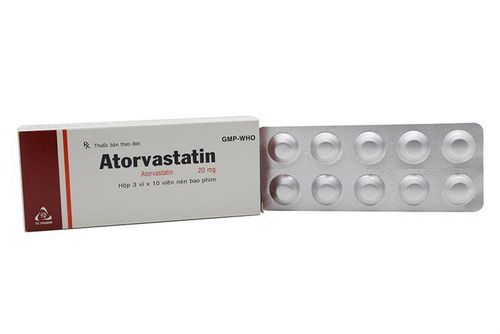This is an automatically translated article.
Effects of glenlipid drugs have been proven effective in the treatment of dyslipidemia. The article will provide readers with some general information about this drug.
1. Effects of the drug Glenlipid
Glenlipid 100mg contains the main active ingredient ciprofibrate with a concentration of 100mg. This is a fibric acid derivative with lipid-lowering effects. The drug lowers triglycerides and VLDL and increases high-density lipoprotein cholesterol (HDL). This effect helps to improve the distribution of cholesterol in the blood plasma. In addition, the drug has a fibrinolytic effect.
In hyperlipidemic patients, ciprofibrate can significantly reduce plasma fibrinogen and increase fibrinolytic activity. This is considered a beneficial effect of the drug. Glenlipid is indicated for use in cases of dietary support to reduce total cholesterol, LDL cholesterol, triglycerides and increase HDL for patients with primary hyperlipidemia or mixed dyslipidemia. Lipid-lowering agents are often used in combination with a diet low in saturated fat and cholesterol when non-pharmacological measures have not yielded good results. Ciprofibrate is absorbed from the gastrointestinal tract, peak plasma concentrations are achieved 1 to 4 hours after dosing. Food may reduce peak concentrations and prolong the time to peak drug concentrations, but has no appreciable effect on AUC and half-life. Ciprofibrate is highly bound to plasma proteins (95-99%). The drug is excreted in the urine as glucuronide conjugates (more than 70%) and unchanged (approximately 7% to 27%).
2. What is the dosage of Glenlipid?
Glenlipid is taken orally. Patients can take the drug with or without meals. The usual dose is 1 tablet of 100mg x 1 time / day.
The drug is contraindicated in patients with severe renal impairment. For patients with moderate renal impairment, reduce the dose to 1 tablet every other day. Renal clearance is reduced and the half-life is doubled in patients with severe renal impairment. Mild renal impairment may slow urinary excretion of ciprofibrate but not alter the extent of excretion.
Dosage may vary depending on the condition and severity of the disease. You need to consult a specialist to get the right dosage.

Thuốc Glenlipid được sử dụng trong điều trị bệnh rối loạn lipid
3. What to do in case of an overdose of Glenlipid?
Currently there are not many data on the overdose of ciprofibrate. There is no specific antidote for ciprofibrate poisoning. Patients are usually treated symptomatically and with respiratory and circulatory support if necessary. Ciprofibrate cannot be excluded by dialysis.
4. What are the side effects of Glenlipid?
Undesirable effects of the drug include:
Nausea, vomiting, stomach pain, dry mouth, indigestion, diarrhea Rash, urticaria, itching Hair loss, photosensitivity Increased liver enzymes Ciprofibrate may increase plasma creatinine and urea Myalgia, myositis, muscle weakness The drug may sometimes cause dizziness, somnolence or fatigue. Leukopenia, thrombocytopenia Decreased sexual function You need to inform your doctor when you encounter unwanted effects of the drug. In particular, when you suspect that you have muscle problems such as myositis, rhabdomyolysis or when creatine phosphokinase levels are significantly elevated, you should stop taking ciprofibrate and contact your doctor immediately.

Người bệnh có thể gặp triệu chứng buồn nôn khi dùng thuốc Glenlipid
5. What is Glenlipid's note?
Glenlipid drug is contraindicated in patients with hypersensitivity to ciprofibrate or other components of the drug, pregnant and lactating women, children, patients with severe liver and kidney failure. Use with caution in patients with gallbladder disease, gallstones, patients with impaired liver/kidney function and hypoalbuminemia. Ability to drive and use machines: The drug can cause dizziness, fatigue, somnolence, so caution should be exercised when driving and operating machinery. Pregnancy: There is no evidence that ciprofibrate is teratogenic, but fetal toxicity has been observed at high doses in animals. There are currently no data on the use of the drug in pregnant women. Therefore, ciprofibrate is contraindicated in pregnant women. Lactation: Animal studies have shown that ciprofibrate is excreted in the milk of lactating rats. There are not many data on the use of the drug in lactating women. Therefore, the drug is contraindicated in lactating women. According to experts, the use of ciprofibrate with some other drugs can reduce the effectiveness of the drug or cause many dangerous side effects. In particular, the combination of HMG CoA reductase inhibitors (pravastatin, simvastatin, fluvastatin) with fibrates significantly increases the risk of muscle damage and acute pancreatitis. Therefore, patients need to inform their doctors about all drugs and supplements they are using for appropriate advice.
Please dial HOTLINE for more information or register for an appointment HERE. Download MyVinmec app to make appointments faster and to manage your bookings easily.













